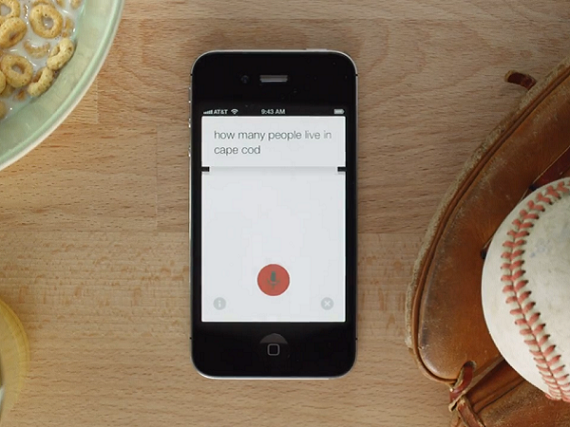
Watch out Siri! After being the only game in town for the last year or so, you’ve finally got some competition!
Google has added a brand new feature to its Google Search app, the company announced on its blog Tuesday: voice search.
With the voice recognition features, the words will appear as the users speaks them. The answers will be given immediately, and will be spoken out loud if the answer is short, for example is asking if a flight is on time.
“When you have a question, finding the answer should be effortless—wherever you are and whatever device you’re using. The new Google Search app for iPhone and iPad helps you to do just that with enhanced voice search that answers any question with the comprehensive Google search results you know and love,” Kenneth Bongort, Google Search engineer, wrote.
While the app does not integrate with the phone the way that Siri does, and usually brings up traditional Google searches, it does seem to be intregrated into other Google services, including YouTube and GoogleMaps.
The app uses Google’s Knowledge Graph “which gives our search technology an understanding of people, places and things in the real world.”
The Knowledge Graph was introduced in May. At the time, Amit Singhal, Google SVP of engineering, said that it enhanced search by making it more intelligent, by giving users a better summary and by giving deeper and better answers.
Singhal called it “a critical first step towards building the next generation of search, which taps into the collective intelligence of the web and understands the world a bit more like people do.”
Now it is being used to power the next stage in search.
Here are some examples that Google gives on what kind of information users can find by using the new voice search option:
- “What does Yankee Stadium look like?” Google will show you hundreds of pictures instantly.
- “Play me a trailer of the upcoming James Bond movie.” The trailer starts playing immediately right within Google Search.
- “When does daylight savings time end?” The answer will appear above the search results, so you can set your clock without having to click on a link.
- “Who’s in the cast of The Office?” See a complete cast list and find out who made you crack up last night.
Despite being the major selling point of the iPhone 4S, Siri was never not quite as popular as Apple had hoped it would be. A survey taken by Parks Associates in March showed that only 55% of people who used Siri were satisfied with it.
That is still much higher than the 9% who said they were dissatisfied, but it also leaves a lot of people who, frankly, seem unimpressed with the virtual assistant.
This might partly be due to the lack of experience with it, as many in the survey did not seem willing to use the service beyond its basic functions. While 87% of people said that they used Siri in some capacity, most of them only used it for basic functions, neglecting its other features.
While dissatifaction with Siri has not hurt Apple sales, Google obviously sees an opportunity to hone in on a potentially vulnerable spot for Apple.
Google also debuted voice search on its new Android 4.2 platform on Monday, along with three new Nexus product: the Nexus 4 smartphone, the Nexus 7 tablet and the new Nexus 10 tablet.
Check out Google’s video about the new voice search function below:





















